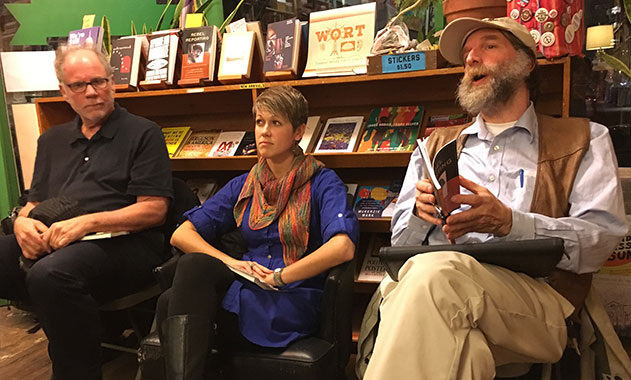From student to ‘Rebel Reporter’
Former Madison College student and Clarion editor publishes book
Cristalyne Bell (center), sits with co-editor Norman Stockwell (right), and Robert W. McChesney, who wrote the foreward to “Rebel Reporting” during the book launch inside The Rainbow Bookstore Cooperative on Dec. 15 in Madison.
January 19, 2016
Cristalyne Bell was 23 when she started at Madison College and she wasn’t sure what she wanted to do.
“I thought about taking a couple of classes to just see how it went, and I was really impressed with Larry [Hansen’s] World Issues Journalism class, so I stayed,” said Bell.
Five years later she’s published a book and is pursuing a Masters of Fine Art in creative non-fiction at Oregon State University, where she also teaches.
Bell is co-editor of the recently published book “Rebel Reporting: John Ross Speaks to Independent Journalists”. Ross, who died in 2011, was an independent reporter who believed journalists should use their power for good. The book is an adaptation of a series of lectures Ross gave during his residency at the New College of California in 2006. Ross would later repeat those lectures as he traveled the country speaking to students.
It was one of these lectures that Bell heard in a journalism class at Madison College.
“John Ross sort of hobbles in, sits down. The first thing John does is say ‘So objectivity is a lie, and the very fact that you’re sitting in this room is a problem’”, said Bell. This is counter to the traditional journalistic ethic of objectivity that Bell had heard in her previous classes. Ross went on to explain his views that journalists should use their power to make changes happen in the world. Bell said that lecture is, “…why I’m pursuing journalism at all”.
Bell’s co-editor on the book is Norman Stockwell, operations coordinator at WORT in Madison. Stockwell said, “John had a commitment to telling the stories of the people at the bottom, the people affected by the polices of governments and corporate capitalists.”
Bell’s first taste of journalism was at the Clarion, where her awards still adorn the walls. She began as a reporter, later being promoted to Editor-In-Chief.
“I came in there with no knowledge of what I was doing. It was basically the foundation of what was built underneath me that put me where I’m at today,” said Bell.
“I definitely became a better writer because I read more and wrote more. I had never written that much before in my life.”
Bell says the book is for, “Anybody who’s in a journalism class. I’m a testament to the success of these words. It’s written in a very casual tone, so it’s very digestible, but it gets into some really dense topics.”
The book is split into two parts. Part one is Ross’s lectures. Part two is an extended article written by Ross that illustrates the points he makes in part one. The book also includes an appendix of resources for independent journalists. Separating parts one and two are a series of illustrations by local Madison artist Lester Doré who worked with Ross to promote his various books and speaking engagements.
Bell is unsure what her next project will be.
“Right now I’m focusing on teaching and working on my own personal essays and personal work,” she said.































